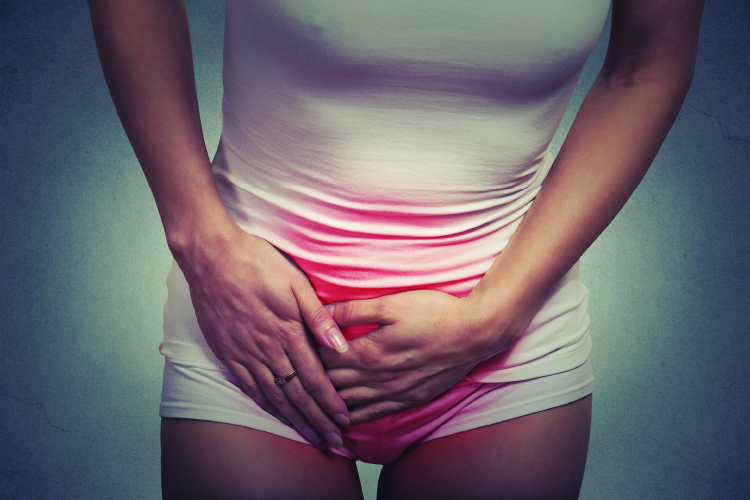Vaginal health is many times overlooked or dismissed, but this is just as an important part of a woman’s overall health as any other. Vaginal health issues can cause a lot stress and discomfort to a woman, and this is not even about the negative impact they can have on the self-confidence or the relationships of the affected woman, but they can also have quite severe consequences such as infertility or even lead to life-threatening complications.

So, let’s see in which ways and by which factors can the health of the vagina be affected:
Table of Contents
What’s normal when it comes to the vagina’s health
The monthly period
Ok, this may sound too basic, but it must be pointed out that it is normal to have monthly periods, it is normal not to have periods during pregnancy and even for a short while afterwards, and it is also normal to have irregular periods when the menopause begins.
Vaginal discharge
Many women are not sure what to think when it comes to the vaginal discharges, but that is also a perfectly natural and normal phenomenon. Actually, that is the way a healthy vagina cleans itself and maintains a normal pH.
Vaginal dryness
Even though vaginal dryness sounds like a problem (and there are situations when it is), there are also several conditions when this is a normal consequence and should not be a reason to worry. First of all, there are certain women who, physiologically, do not produce enough natural lubrication. Second, usually after childbirth and during lactation, women tend to experience vaginal dryness because of the hormonal changes, but this is a temporary situation.
And, finally, after the menopause, also because of hormonal changes, women start to complain about this issue, even though it didn’t use to be a problem before. In all these three conditions, vaginal dryness is nothing but a natural phenomenon and using a bit of lubrication when engaging in sexual activities can solve the problem instantly.
What’s not
 Changing the characteristics of the period
Changing the characteristics of the period
When the characteristics of the period change, such as the amount, duration, the days between periods or even the level of discomfort during those days, these are all warning signs that something may not be quite alright. Bleeding between periods, after or during intercourse or after you have enter menopause are also indicators that there is something wrong and that you should be consulted by a medical specialist.
A change of the normal vaginal discharge
It was mentioned earlier that vaginal discharge is normal, but any changes to it, such as the colour, the texture, the smell or the amount are usually triggered by other underlying conditions. These types of changes are not normal for a healthy vagina and show that there is at least an unbalanced vaginal flora, which should be checked out.
Vaginal irritation, itching or pain
Irritation, itching and pain are never good signs, regardless of the body area where they occur. Even if these symptoms only happen during intercourse, they are still reasons to worry about your vaginal health and more than enough reasons to undergo some investigations and find out the underlying cause.
Feelings of pressure or any lumps or masses in the vagina
Needless to say that any strange feeling in the pelvic area, or any lump or bulk that you feel in your vagina could be the result of serious health conditions and that anyone experiencing such issues should look for medical attention immediately!
The most common causes for vaginal health issues
 Vaginal infections
Vaginal infections
The most common vaginal infection is the yeast infection, closely followed by other fungal or bacterial infections. The most common symptom of a vaginal infection is a change in the vaginal discharge. The mistake many women do is trying to fix the problem by using all sorts of feminine hygiene products or intimate scented sprays. These solutions are only temporary, but apart from this, the real problem is that if these infections are left untreated, they can lead to even more serious problems, such as infertility and more.
Unprotected sex
Having unprotected sex can put anybody to great risks, especially if we are talking about multiple partners or about partners whose complete medical history is unknown. Not using a condom poses a great risk of catching a sexually transmitted infection such as genital warts, Chlamydia, gonorrhea or syphilis, to name some of the treatable ones, but also infections such as genital herpes or even HIV, that currently have no cure. These infections usually lead to very unpleasant symptoms, such as vaginal sores, pelvic pain and abnormal vaginal discharges, but they can also lead to infertility and even debilitating or life threatening situations.
Other health conditions
There are some underlying health conditions that can affect the overall wellness and health of the vagina. Pelvis inflammation or vaginal cysts can cause painful intercourse and conditions such as endometriosis and vaginal cancer, although it is rare, can cause, apart from vaginal pain, abnormal bleeding between periods or even after the menopause. Usually, treating these conditions solves the vaginal problems as well.
Certain drugs or medical treatments
Usually, the medical specialists prescribing the drug or performing the medical treatment let women know about the possible side-effects, including the negative effects on the vagina. The most well known drugs in this category are the antibiotics, which increase the risk of vaginal yeast infections. Also, certain cancer treatments or pelvic interventions can be followed by pain during sexual activities, with or without vaginal dryness.
Feminine hygiene products
Despite all the commercials and recommendations, special feminine hygiene products cause more harm than good – and this is also the unanimous opinion of doctors. The vagina has a very efficient self cleaning mechanism and all that these products manage to do is disturb the normal and the healthy vaginal flora and pH and make it more prone to infections and other problems. Vaginal showers, soaps or, even worse, scented sprays are never a solution or good idea. The most common reasons women use these products are abnormal or smelly vaginal discharges, but as it was already mentioned, these are usually signs of a vaginal infection. Using chemicals under these conditions will only worsen the problem that can otherwise be so easily solved with a visit to a gynecologist.
Psychological issues
Last but not least, there is a broad category of psychological issues that can influence a woman’s vaginal health. From irregular or excessively uncomfortable periods, to pain or discomfort during sex, stress or other negative and traumatic experiences can tremendously affect a woman’s life. If no underlying medical condition is found to cause such problems, then talking to someone close, a counselor or even a psychologist could be the best and the actual remedy to the problem.
Solutions?
If any woman experiences any of the conditions mentioned above, the best thing to do is to go to a medical specialist. There are many cases in which women choose not to go to a doctor either because, for some reason, they feel shame, or simply because they don’t consider it a ‘real’ health issue, or they find it easier to take over-the-counter medications – these are mistakes that can lead to serious complications and the sooner more women can understand this, the better.
On the other hand, there are also some common-sense, prevention measures that any women can make part of their routine and life-style. Simple things such as choosing healthy foods, exercising (your vagina, why not?), staying clean in a proper way (NOT with intra-vaginal showers and/or products) and having a responsible sex life are very probably going to keep you away from most, if not all of the mentioned vaginal health problems. And even if you happen to have a problem, it can be easily solved by visiting a doctor.
So, in the meantime, just keep in mind that a healthy vagina is a happy vagina!


 Changing the characteristics of the period
Changing the characteristics of the period Vaginal infections
Vaginal infections















